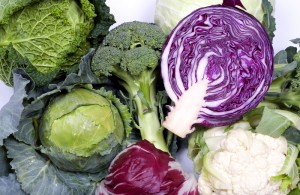Popeye needed spinach for a bulging biceps, but new research points to more exciting possibilities. The regular intake of green leaf vegetables and cruciferous vegetables (broccoli, cauliflower and cabbage) is associated with a preservation of cognitive function. In the Nurses’ Health Study starting in 1984 women were asked to fill out food-frequency questionnaires. They were asked about their usual intake of a specified portion of food items, including 15 fruits and 28 vegetables. At a later date, between 1995 and 2001, researchers decided to ask the oldest participants (70 years and older) to participate in a cognitive function study. The tests were repeated 2 years later.
The main finding of the study is that women with the highest intake of green, leafy vegetables had the least decline in their cognitive function, when compared to those with the lowest intake. The vegetable lovers, who consumed five serving of cruciferous vegetables, like broccoli, cabbage and cauliflower had less decline in their cognitive function. On the other hand the highest decline showed up in the group that averaged only 2 servings per week. These findings were significant enough to be presented at the ninth International Conference on Alzheimer’s Disease by Dr. Jae Hee Chang, a researcher at the Channing Laboratory of Harvard Medical School. The effect may seem modest, but nutritional habits can obviously delay or prevent the onset of dementia.
This effect seems to be independent from the beneficial effect of bioflavonoids that vegetables also contain.
Other interesting observations about Alzheimer’s research: http://nethealthbook.com/neurology-neurological-disease/alzheimers-dementia-and-delirium/alzheimers-research/
Reference: The Medical Post, August 17, 2004, page 8
Last edited October 26, 2014






